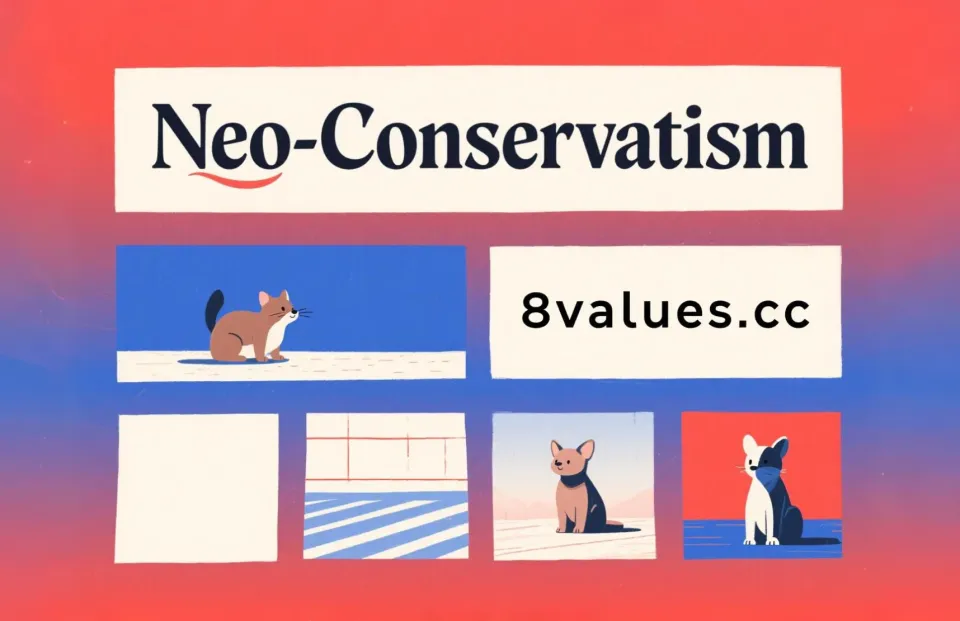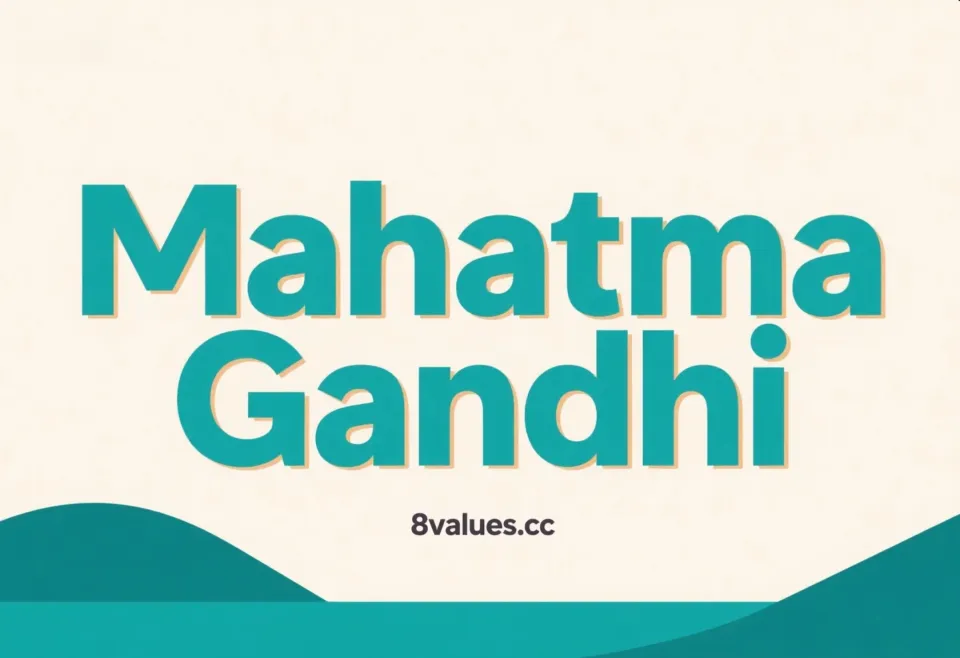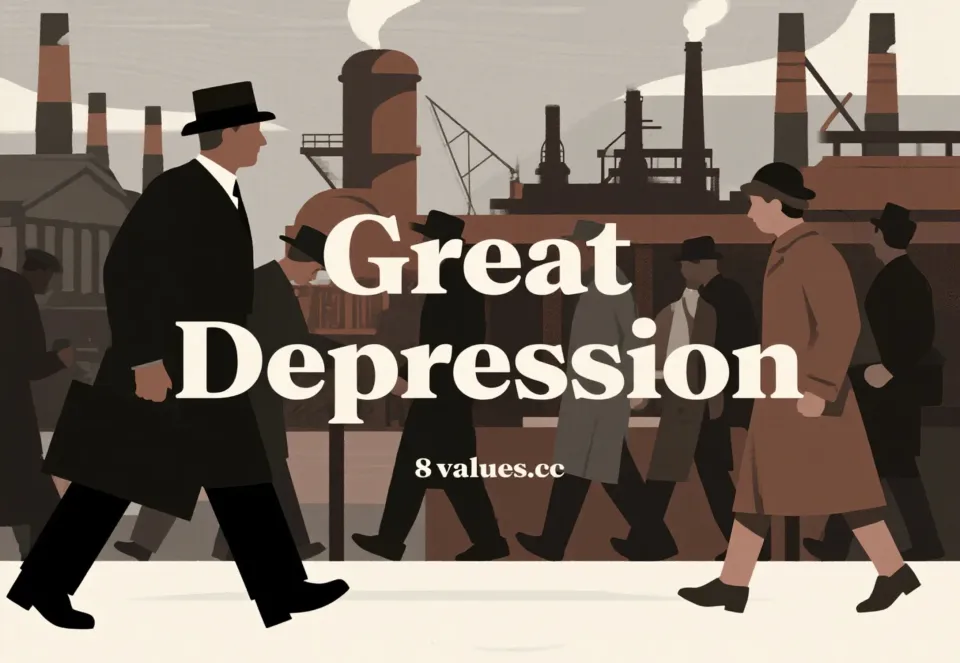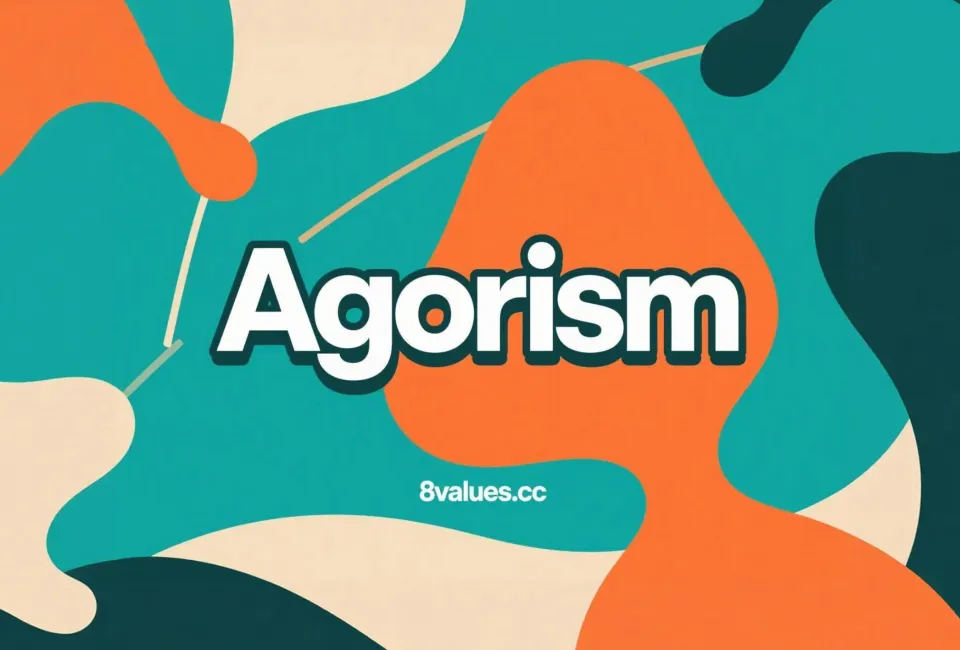Neo-Conservatism | 8values Interpretation of ideological ideology in political tests
A thorough interpretation of Neo-Conservatism, an important American political ideology, from its origin, core propositions, historical evolution to contemporary influence, helps you fully understand its positioning in the 8values test and its shaping of the global political landscape.
"Neoconservatism" is literally "neoconservatism", where "Neo" originates from the Greek word "new", while "conservatism" refers to a political right-wing position. The term was originally used as a derogatory term in the early 1970s and was coined by its former left-wing comrades, intended to mock former liberals or former communists whose political views turned right. However, the neoconservatives later readily accepted the title and regarded it as a sign of honor.
Understanding neoconservatism is not easy because it is not a fixed and coherent political ideology, but more like a "persuasion" or "worldview", whose connotation continues to evolve over time and changes in historical context. As its "godfather" Irving Kristol said, neoconservatives are "liberals who are struck by reality." It combines certain characteristics of traditional conservatism, political individualism, and conditional recognition of the free market.
The Origin and Evolution of Neoconservatism
The origins of neoconservatism can be traced back to a group of intellectuals in New York City in the 1930s, who were initially activists of the political left, many of whom were even former Trotskyists or Marxists. However, in the 1960s and 1970s, they gradually turned to the conservative camp after being extremely disillusioned by the following points:
- Disgust for the New Left and Counterculture : They strongly oppose the radical left movements of the 1960s, the counterculture trends and their hostility to authority, customs and traditions. Norman Podhoretz believes that aversion to counterculture is the single biggest factor in many people's turn to neoconservatism. They are particularly disgusted with the growing romantic radicalism in the student movement, believing that this leads to negative consequences.
- Disappointment with liberal policy : They were dissatisfied with the Lyndon Johnson administration’s “Great Society” program (designed to eradicate poverty and crime) and believed that these well-intentioned social programs failed to reduce crime, which instead led to urban chaos, decline in education standards and the emergence of welfare-dependent classes.
- Opposition to affirmative action : Neoconservatives initially supported the civil rights movement, but later opposed the "affirmative action" or the affirmative action bill, believing that these policies give preferential treatment to minorities, undermining the opportunity for equal competition, and especially disadvantages for groups such as Jews who have advantages in exams.
- Questions about Democratic foreign policy : They are concerned about the Democratic party’s growing pacifist foreign policy, its easing attitude towards the Soviet Union, and its isolationist tendency after the Vietnam War.
- Persistence on traditional values : Many neoconservatives are fearful and disgusted by the moral relativism that emerged in the 1960s, believing that society is becoming immoral, disoriented and degenerate. They emphasize the importance of traditional values such as religion, family and legal order.
Irving Cristo is widely regarded as the "godfather" of neoconservative thought. Other important figures include the famous sociologist Daniel Bale , Daniel Patrick Moynihan , who later served as the U.S. Senator, Norman Podhoretz , editor-in-chief of the magazine "Commentary" and Jeane Kirkpatrick , ambassador of the United Nations.
Early neoconservatives focused more on domestic issues, such as reexamining the “Great Society” program and welfare state through social science research. However, foreign policy issues quickly dominated. The Six-Day War of 1967 had a profound impact on many Jewish intellectuals, prompting them to support Israel and rethink the role of American power in the world. This war and subsequent concerns about the Soviet threat gradually took shape in foreign policy positions such as anti-communism, strengthening military power and defending democratic allies.
The "Three Generations" Evolution of Neoconservatism: From the Cold War to the "unipolar Moment"
The history of neoconservatism can be seen as a continuous process of three generations or three “families”, each with its own unique focus and evolutionary trajectory.
The First Generation: Original Neoconservatives and Domestic Issues
This group of intellectuals mainly gathered around the magazines "The Public Interest" and "Commentary". They were still liberals at first, but opposed the leftist tendency that emerged within liberalism at that time, especially in domestic policy, to warn of the limitations of social engineering and the dangers of radical egalitarianism.
The Second Generation: "Skupp Jackson Democrats" and the Cold War
In the 1970s, the influence of the New Left on the Democratic Party grew as George McGovern won the 1972 Democratic presidential nomination. This prompted a strong backlash from a group of traditional Democrats, many former socialists or Trotskyists, who were called "Scoop Jackson Democrats." They support domestic progressive policies (such as social projects in the New Deal period), but are strongly anti-communist diplomatically, advocate the defense of human rights and democratic countries (including Israel), and strengthen the U.S. military power.
This group of people criticized Nixon and Kissinger for being too weak in easing policies. Their views later profoundly influenced the foreign policy of the Reagan administration, and many held middle and lower positions in the Reagan administration, promoting "Reaganism", the establishment of the National Foundation for Democracy, the condemnation of the "evil empire" of the Soviet Union, and the construction of military power. However, they eventually broke away from Reagan's dismay at some of the aspects of his policy toward the Soviet Union.
The Third Generation: "New Conservatives" and "unipolar Moment" after the Cold War
With the end of the Cold War in 1989, many people once believed that the neoconservative movement had "deadly died." Yet a new and younger generation of neoconservatives emerged in the mid-1990s. This group of people is different from the previous two generations. Most of them have never been Democrats or liberals, but are firmly rooted within the Republican Party.
They worked to solve the problems of the post-Cold War world and firmly believed that the United States was the only superpower in the world, opening up the "unipolar moment", a term proposed by the famous neoconservative columnist Charles Krauthammer. They believe that the U.S. foreign policy should be committed to maintaining and extending this "unipolar moment" as much as possible.
During this period, they actively lobbyed the Clinton administration to call for tougher foreign policies, including national missile defense systems and regime change in Iraq. They firmly believe that Saddam Hussein must step down because he challenged the U.S. power in the Middle East, a region with geopolitical significance due to its energy reserves. In 1998, the U.S. Congress passed the Iraq Liberation Act, formally establishing the overthrow of the Iraq regime as a US government policy, and neoconservatives played an important role in the process. Their main positions include The Weekly Standard, founded by William Kristol and Robert Kagan in 1995, the American Enterprise Institute (AEI), and the Project for the New American Century (PNAC) .
Core principles and policy propositions of neoconservatism
As a political philosophy, neoconservatism has a core element that transcends a simple external tough stance. It has formed a unique concept system in domestic and foreign policies.
The "Five Pillars" of Foreign Policy
- Internationalism : Firmly believe that the United States should actively participate in global affairs and shape the international order, rather than retreat. If the United States does not actively shape it, other major powers may shape the world order in ways that are not conducive to American interests and values.
- Hegemony/Primacy : It believes that the United States’ global hegemony is beneficial to the United States and the world, so it must be maintained and strengthened.
- Unilateralism : Sceptic about international institutions (such as the United Nations) and believe that they are inefficient and often used by dictatorial powers. The United States should retain the ability to act freely without being bound by unnecessary treaties or international law.
- Militarism : emphasizes the key role of military forces in international affairs, advocates maintaining a high level of defense spending, and is ready to use force to deal with global responsibilities at any time.
- Democracy Promotion : It believes that promoting democracy on a global scale is not only a moral right choice, but also a strategic wise move. Because democracies tend to be more friendly to the United States and take less warlike action against their neighbors.
Domestic policy tendencies
The neoconservative domestic policy stance is also very clear:
- Economic policy : advocates free markets and tax cuts, emphasizing economic growth. They have a relatively loose attitude towards budget deficits and believe that it is an acceptable compromise if it can lead to long-term economic growth.
- Welfare State : Not against all government intervention, but skeptical about the excessive expansion of welfare states, opposes top-down social engineering, arguing that these plans may lead to dependence and weaken individual initiative.
- Law and order and traditional values : emphasize law and order, and maintain traditional cultural values such as religion and family. They believe that a healthy democratic culture requires active participation by the state in maintaining it. They oppose multiculturalism and political correctness, believing that these trends may undermine the traditional culture and cohesion of the country.
- Immigration Policy : Usually conservative about immigration policy, emphasizing the singularity of cultural identity.
Neoconservatism and Israel: A core pillar
Supporting Israel is a core pillar of the neoconservative worldview. This tendency was particularly prominent after the Six-Day War in 1967, when many Jewish intellectuals began to reassess their views on American power and firmly believed that Israel, as a democratic fortress, had its existence seriously threatened by its Arab neighbors.
Some critics argue that neoconservative policies prioritize Israeli interests, even linking them to “Jewish conspiracy theory.” However, many non-Jewish neoconservatives have similar positions, and the support of neoconservatives for Israel does not mean that they will be completely subject to all policies of the Israeli government. They believe that both the United States and Israel have moral particularity and should not be bound by international norms or institutions, but should maintain an overwhelming military force to deal with the threat.
The comparison between neoconservatism and other conservative schools
The complexity of neoconservatism is also reflected in its similarities and differences with other conservative schools.
Traditional Conservatism
- Economics and Society : Traditional conservatism usually emphasizes small government, low taxes and free markets, focusing on the value of religious, family and individual struggles. Neoconservatism overlaps in these aspects, but is more alert to the social impact of capitalism, believing that it may undermine tradition.
- Diplomacy : In anti-communism, the two have something in common. However, traditional conservatism is more diplomatically inclined toward “Realpolitik” and “non-interventionism”, while neoconservatism is more interventionist and advocates the promotion of democracy through force. Neoconservatism is less vigilant about the expansion of state size, and even believes that the size of government can be expanded for the sake of national interests and the world order.
With Paleoconservatism
Old conservatives were more traditional conservatives who tended to isolate foreign policy, opposed the Middle East war, and focused on localism. They also oppose open borders and the LGBTQ+ agenda and tend to trade protectionism rather than free trade. Old conservatives regard neoconservatives as “imposters” or even “mutilating Trotskyists”, accusing them of pursuing “utopian permanent revolution.”
Nationalist Conservatives / America First
A new generation of conservatives represented by Donald Trump, Rand Paul and Ted Cruz are skeptical of neoconservatism. They advocate "America First" to reduce overseas military intervention and focus on U.S. domestic interests and border security rather than foreign borders such as Ukraine. Nevertheless, they overlap with neoconservatism in economic nationalism (such as trade protectionism) and cultural conservatism (such as opposing illegal immigration and multiculturalism).
Neoliberalism
- Economic philosophy : Both support capitalism, but neoconservatism is more skeptical about the social problems that capitalism may cause and the destruction of traditional culture. Neoliberalism tends to see social problems as economic problems and may be resolved through state redistribution.
- State role : Neoconservatives are not as alert to budget deficits and government intervention as Hayek believes that government intervention and budget deficits can defend democracy when necessary.
- Foreign Policy : Neoliberal foreign policy often emphasizes reducing conflict and promoting prosperity through trade and foreign interconnection rather than mere force. However, in some historical periods, such as the later period of the Clinton administration, the foreign policy objectives of neoconservativeism were also adopted by neo-liberal governments.
Criticism and controversy of neoconservatism
Neoconservatism has been accompanied by fierce criticism and controversy on the political stage:
- Believer and interventionism : Critics often describe neoconservatism as "war hawks" and tend to use military forces as their first choice rather than last resort to interfere in other countries' internal affairs.
- The Failure of the Iraq War : The Iraq War in 2003 was widely regarded as a catastrophic failure of neoconservative policies, with its “idealist military intervention” and optimistic expectations of democratic promotion leading to post-war chaos and protracted conflict. Many critics argue that neoconservatives lack sufficient foresight of the consequences of democratic output, and their grand social engineering ambitions ultimately brought disaster.
- Intelligence manipulation : There are allegations that neoconservatives manipulate intelligence before the Iraq War to support their policy of regime change.
- Contempt for international institutions : Neoconservatives have been criticized for their contempt for international institutions (particularly the United Nations) and their tendency to act unilaterally.
- " Trotskyism " accusations : Some critics argue that because the founders of neoconservatism included former Trotskyists, some characteristics of Trotskyism were preserved in their thoughts, such as the belief that history can be promoted by power and will, and even compared it with Leninism . However, the neoconservative anti-capitalist and anti-imperialist stances contradict Leninism’s core beliefs.
- Imperialism and Secret Agenda : Scholars such as John McGowan believe that neoconservatism aims to build an American-led "American empire", but because it is contrary to the anti-imperialist tradition of the United States, its real goal is "not to mention its name" in public.
- Priority to Israel’s interests : The priority of Israel in policies and whether certain policies serve Israel’s interests is one of the long-term controversies that neoconservatism faces.
The contemporary status and future trend of neoconservatism
Although the neoconservative “idealist military intervention” was widely questioned after the Iraq War, and many believed it had declined, it still exists as a force that cannot be ignored in the political landscape of the United States.
- Integrate into the mainstream : Neoconservatism has been largely integrated into mainstream American conservatism and the Republican Party. Although it no longer has a single unification issue as it used to be, belief in aggressive American foreign policy remains.
- Decline of influence and conflict within the party : Neoconservative influence within the Republican Party has declined since the rise of the Tea Party Movement and Donald Trump. Many neoconservatives oppose Trump and even chose to support Democratic candidate Kamala Harris in the 2024 U.S. presidential election because her foreign policy views are more in line with their military interventionist stance.
- Role in Administration : Although Trump nominated some once considered neoconservative politicians into the cabinet after winning the election in 2024, observers believe these people’s stance has shifted to “America First,” meaning neoconservatives may have been marginalized within the Republican Party. However, new conservative figures such as Victoria Nuland still hold key positions in the Obama and Biden administrations, showing their continued influence in the field of foreign policy.
Looking ahead, challenges facing neoconservatism include how to deal with budget constraints, as well as opposition from the growing liberalist faction and nationalist conservatives within the Republican Party. Nevertheless, neoconservatism will remain an important voice in the US foreign policy debate for the foreseeable future due to its firm worldview, influence in think tanks and media, and the adaptability of its ideas.
If you want to know more about your position in the political spectrum, or explore more detailed interpretations of ideology, you can visit the official website of 8values Quiz for testing and check all results for detailed interpretations of 52 ideologies . The website also provides political spectrum coordinate analysis tools and official blogs to help you understand the complexity of political thought more deeply.






